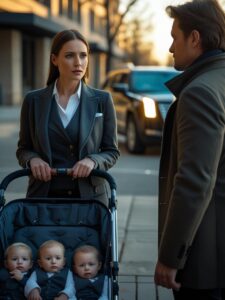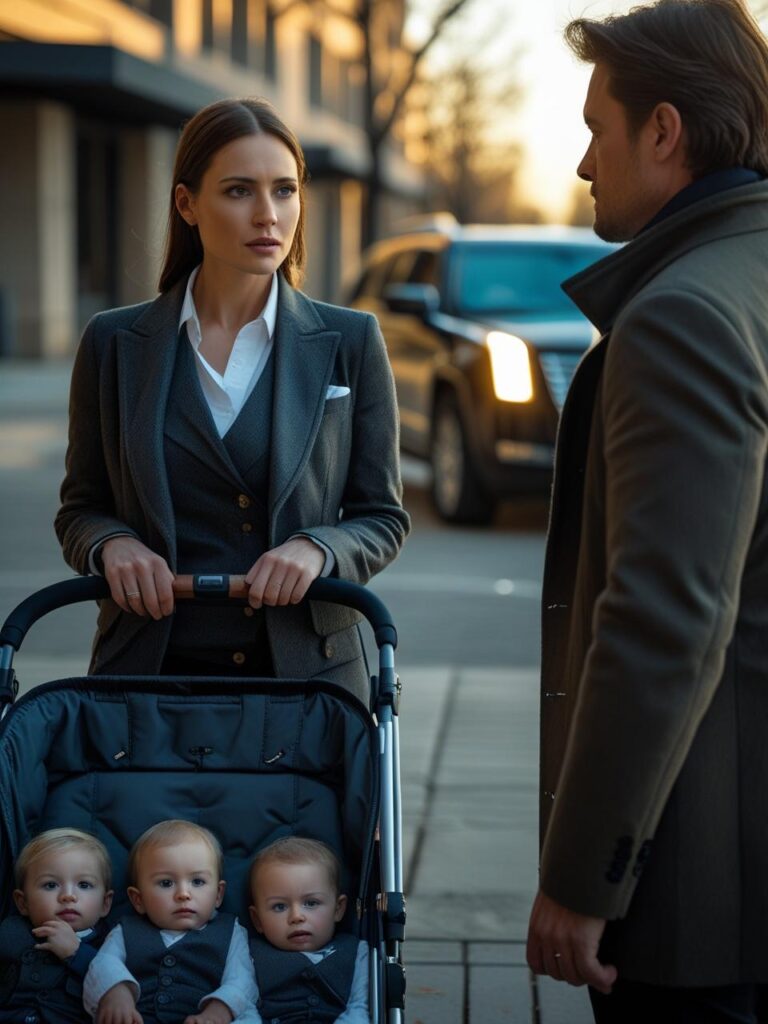The golden light of late afternoon spilled across the quiet streets of Millhaven, bathing red brick rooftops in honeyed warmth and casting long shadows over the cobblestone paths. The breeze carried with it the scent of fresh bread from the old bakery and the distant chime of the church bell. At the far edge of the aging train station, a man stood like a statue—rooted to the spot, haunted.
His name was Adrian Langford. Wealthy. Polished. Untouchable. Or so the town remembered him. Today, though, the mask he had worn for years had cracked. His tailored suit couldn’t hide the tremble in his hands or the shock frozen across his face. A paper cup of espresso slipped from his fingers and hit the platform with a soft splash, the dark liquid bleeding into the dust unnoticed.
His eyes were locked. Focused. Not on the train that had just pulled in, but on someone he thought he’d never see again. No—someone he had convinced himself he’d never have to see again.
She stepped off the train, quiet and composed. Her soft chestnut curls were tucked beneath a linen scarf, and her pale yellow sundress fluttered in the breeze. Graceful. Steady. But it was not just her presence that unhinged him.
She wasn’t alone.
A double stroller rolled ahead of her, and a baby was cradled to her chest in a sling. Three babies. Matching sun hats. Tiny, gurgling sounds barely rose above the hum of the train engine. His mind couldn’t compute what his eyes were showing him.
Adrian’s breath hitched.
He took one step forward—uncertain whether he was walking toward her or toward the guilt that had lived quietly inside him for years. But in a heartbeat, she was swallowed by the crowd of arriving passengers and curious onlookers.
“Is that… her?” he murmured, the words barely audible.
A raspy voice interrupted his disbelief. “Funny town, isn’t it?” He turned sharply. An elderly woman stood by the newspaper kiosk, pretending to skim a magazine. Her eyes, sharp and knowing, didn’t leave his face. “You think the past stays buried. But sometimes, sweetheart, it walks right back into town—with company.”
There was no witty comeback. No smooth deflection. Just a tight jaw, a clenched stomach, and a memory pressing down on his chest like a weight.
The last time he’d seen Clara, she had stood in his father’s opulent study, her hands trembling, tears running silently down her cheeks. She never screamed. Never begged. She had only looked at him like he had shattered something pure. She’d held a small envelope addressed to her—but never opened it. It was a week before their wedding.
He told her everything: that his family disapproved. That he felt cornered. That love might not be enough. She left that very night and vanished. Not a letter. Not a phone call. Nothing.
Until now.
Clara had changed. The fragility he remembered had hardened into grace. There was a quiet strength in her eyes, a softness in the way she moved. But there was also caution—a natural protectiveness, the instinct of a mother. She wasn’t the girl he left. She was a woman now. A mother. A survivor.
And he… he had no idea.

His legs moved before his thoughts did. He followed her—at a distance—through the familiar lanes of Millhaven. She didn’t look back once.
They passed landmarks of old memories: the café where they’d once spent lazy afternoons, the fountain in the town square where he’d whispered he loved her for the first time. The memories came crashing over him, cruel and tender, while she moved forward—certain, determined, untouched by the ghost trailing behind her.
Eventually, she stopped in front of a quaint little guesthouse tucked behind blooming vines. A small brown dog barked from the steps but didn’t leave its spot. Clara gently unbuckled one baby from the stroller and began humming a lullaby—a tune that clawed at his memory. She used to hum that exact song when she rested her head on his chest after long talks of shared dreams.
He held his breath from behind a hedge.
She laughed then—free and full—when one of the babies tugged at her hair. Her eyes sparkled with joy. She kissed the child and gathered them closer, a portrait of light and serenity. There was no trace of pain. No lingering bitterness. Just warmth and love.
Adrian’s chest ached with something unfamiliar—regret so sharp it felt like punishment. She hadn’t just moved on. She had thrived.
A single question gripped him, cold and heavy: Were those children… his?
He did the math in his head. It was possible. Just barely. His fingers twitched, mind racing. He should go to her. Say something. Anything. That he was sorry. That he regretted everything. That he wanted the truth. That he wanted to know if he had a family out there.
But then… what right did he have?
The guesthouse door opened, and an older woman emerged. Clara smiled and handed her one of the babies. They exchanged kind words, like old friends. The scene was one of peace. Clara looked safe here. Happy. Like she belonged.
Adrian stepped back.
Maybe he didn’t deserve an answer. Maybe the silence he gave her back then had sealed that fate.
But just as he turned to leave, Clara glanced up.
Her eyes met his. Not with anger. Not with shock. Just a calm, measured awareness. A faint smile played at the corners of her lips. It was unreadable—but it said everything. She saw him. She knew he was there.
And then… she turned back to her children.
Adrian stood frozen for a moment longer. Then, slowly, he walked away.
Some doors don’t need to be knocked on. Some are better left gently closed.
But even as he stepped onto the platform again, something in him had changed. He no longer felt like the man who once stood above it all—shielded by wealth, ego, and fear. He felt exposed. Vulnerable. Human.
The past never truly disappears. It waits, quiet and patient, until the moment comes when you’re finally forced to face it.
And Adrian Langford had just met his.


